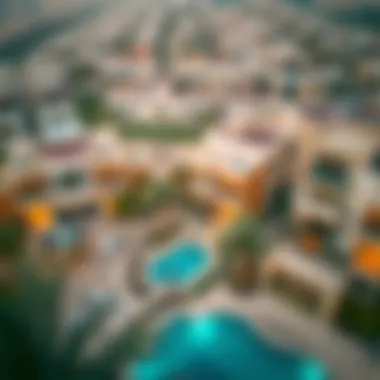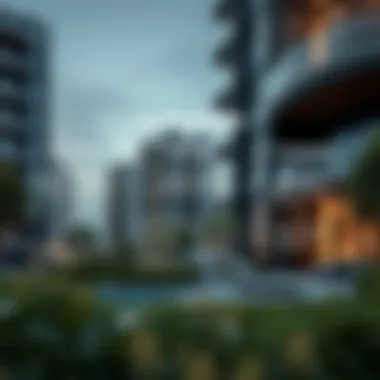Exploring Freehold Areas in Dubai for Investors


Intro
Navigating the landscape of real estate in Dubai, especially when it comes to freehold areas, can feel like finding a needle in a haystack. With a combination of glitz and complexity, understanding property ownership in this vibrant city is not merely a walk in the park. However, a good grasp of the mechanics behind freehold properties can open the door to lucrative investments and a diverse lifestyle. This guide aims to paint a clear picture of what freehold areas are and why they matter, especially for expatriates and savvy investors.
Market Insights
Current Trends in Dubai Real Estate
As of late 2023, the real estate market in Dubai has been experiencing a dynamic shift. There is a growing interest from both local and foreign investors. The allure of freehold areas remains strong thanks to their potential for high returns and the promise of long-term capital appreciation. The market has shown resilience despite global economic uncertainties, primarily driven by an influx of expatriates and tourists. For instance, properties in areas like Dubai Marina and Downtown Dubai have continued to remain in demand, leading to a slight uptick in prices even in a fluctuating market.
Several trends stand out in this current landscape:
- Sustainability: Many developers are now focusing on eco-friendly initiatives, reflecting a global move toward greener living.
- Smart Developments: Integration of technology into properties is increasing, from smart home features to advanced security systems.
- Short-term Rentals: Many investors are capitalizing on short-term rental opportunities, especially with tourism on the rise.
Investment Hotspots and Opportunities
When it comes to investing in Dubai’s real estate, some areas stand out. The market is rich with opportunities that can capture both short-term gains and long-term stability. Key locations include:
- Dubai Marina: Known for its waterside living and vibrant lifestyle, properties here appeal to young professionals and families alike.
- Jumeirah Village Circle: This area is booming due to its more affordable options, attracting many first-time buyers and investors.
- Business Bay: Close to downtown, Business Bay offers both residential and commercial prospects, making it a prime spot for investors looking at diversification.
Understanding these hotspots can help potential buyers and investors to make informed decisions, ensuring they get the most bang for their buck.
Lifestyle Integration
Community Living in Dubai
Investing in freehold properties also means becoming part of a community. In Dubai, neighborhoods are typically designed with sociability in mind. You don't just buy a home; you buy into a lifestyle. Places like Arabian Ranches provide a family-friendly atmosphere with parks, schools, and recreational facilities.
Moreover, many freehold areas foster a sense of community by offering shared spaces where residents can connect—be it through communal pools, fitness areas, or social events managed by homeowners' associations. This aspect of living is often what sways expatriates to choose freehold options over leasehold properties, as it provides a sense of belonging in a foreign land.
Amenities and Luxury Features
Luxury is a key ingredient in Dubai's real estate recipe. Freehold areas often boast high-end amenities and features designed to enhance quality of life. For example:
- Gated Communities: Offering 24-hour security and privacy.
- State-of-the-Art Gyms: With personal trainers readily available.
- Swimming Pools and Spas: Creating an oasis right at home.
These elements not only enhance living experience but also increase property values, reinforcing the long-term investment aspect of freehold properties.
“In Dubai, wealth is not just about possession; it's about quality of life and investment in the future.”
End
Understanding freehold areas in Dubai unlocks doors to not only property ownership but an entire lifestyle. The current market trends show promising potential, while the investment hotspots provide ample opportunities for unrealized wealth. Combining community living with luxurious amenities further solidifies the appeal of these areas. For both expatriates and seasoned investors, this guide offers a solid foundation to begin their journey into the intricate world of Dubai real estate.
To delve deeper into real estate trends and market insights, you may refer to resources like Wikipedia, Britannica, and Reddit.
Prelims to Freehold Areas
Understanding freehold areas in Dubai is crucial for anyone navigating the complex real estate landscape in this dynamic city. As an expatriate, investor, or even a local, grasping what freehold means can fundamentally shape your decisions around property ownership. Freehold properties grant full ownership rights to the buyer, offering flexibility and control that is uncommon in leasehold scenarios. Additionally, with Dubai’s robust economy and an ever-growing expatriate community, freehold properties are becoming hot commodities, drawing interest from all corners of the globe.
Definition and Significance
To put it simply, a freehold property allows the owner complete and indefinite ownership of the real estate, including the land it sits on. Unlike leasehold properties, where ownership is temporary and governed by specific terms, freehold offers a permanent stake in the property, irrefutably appealing to both local and foreign buyers.
What sets freehold apart in the Dubai context is its role in making the city a melting pot of cultures and investments. With over 30 designated freehold areas, the implications are significant. This status not only enhances property values but also fosters a sense of permanence and community among residents. Buyers can rest easy knowing that their investment can appreciate in value over time, potentially yielding fruitful returns.
Historical Context of Freehold Properties in Dubai
The concept of freehold ownership in Dubai is relatively new, gaining momentum in the early 2000s when the government shifted toward a more open real estate market. Prior to this, property ownership was largely restricted to UAE nationals, making it challenging for foreigners to invest.


The landmark decision to allow freehold ownership was part of a broader strategy to diversify the economy and attract international investments. This shift opened the floodgates for expatriates to not just rent but also own a slice of this vibrant metropolis.
"The introduction of freehold areas in Dubai has changed the skyline—and the investment landscape—of the city."
Since then, neighborhoods like Dubai Marina and Palm Jumeirah have transformed, becoming icons of luxury living. This historical shift has laid the groundwork for significant urban development and foreign interest, simultaneously amplifying the city’s appeal as a global hub. This evolution in policy and market dynamics underscores how vital freehold properties are in shaping Dubai’s identity and economic framework.
In summary, the freehold areas of Dubai represent an intersection of ownership, investment, and cultural diversity, essential for anyone interested in property in this compelling city. Grasping these elements not only enriches one's understanding of the market but also equips potential buyers and investors with the necessary insights to navigate this exciting terrain.
Key Features of Freehold Properties
Understanding the key features of freehold properties in Dubai is vital for both investors and homebuyers. Freehold ownership provides a sense of permanence and security that is often not found in leasehold arrangements. Investors are increasingly drawn to the idea of having full ownership of their property, which leads to a multitude of economic and lifestyle advantages. Below, we delve into the specific elements that define freehold properties in Dubai.
Ownership Rights
Freehold properties offer what real estate experts call "total ownership." What this means is that true ownership is transferred to the buyer, granting them the right to sell, lease, or develop the property as they see fit. In contrast, leasehold properties limit the duration of ownership; usually, the lease is set for a finite number of years, after which ownership must revert back to the original landowner.
For many prospective buyers, the appeal of freehold ownership lies in the rights that come with it. Unlike leaseholders, freeholders can customize their property without needing permission from a landlord. With this ownership type, there's a real stake in the ground—figuratively and literally—that can lead to long-term value appreciation.
One thing to remember is that ownership rights also come with responsibilities. Owners are liable for maintenance, property taxes, and compliance with local regulations. Thus, while the freedom to act as one desires is compelling, there's also a layer of diligence that needs to be approached seriously.
Development Regulations
When it comes to freehold properties, understanding the development regulations is crucial. The Dubai Land Department (DLD) and other relevant authorities outline strict building codes and zoning laws. These regulations are established to maintain order, aesthetic appeal, and urban planning standards throughout the various freehold areas.
Before embarking on a construction or renovation project, potential developers should familiarize themselves with the applicable laws. Typically, this includes:
- Permissible Land Use: What type of structures can be erected in certain zones? Residential vs. commercial developments can yield different regulatory challenges.
- Building Height Restrictions: Varying from area to area, knowing the maximum height can steer decisions on property value and potential income.
- Architectural Standards: Local cultures and aesthetics often influence the design. Regulations may mandate certain styles to ensure cohesion within neighborhoods.
- Environmental Regulations: These might dictate the materials used or the footprint of developments to minimize environmental impact.
Adhering to these regulations is not merely a suggestion—it's often a legal requirement. Ignorance can be costly; violations may result in fines or shutdowns of ongoing projects.
Understanding these regulations is not just about compliance; it's about ensuring that the investment aligns with Dubai's broader vision for growth and sustainability.
Overall, the key features of freehold properties create a framework that empowers buyers while also holding them accountable. For anyone considering entering the Dubai real estate market, understanding ownership rights and development regulations provides not just clarity but also a significant competitive edge.
Major Freehold Areas in Dubai
Freehold areas have revolutionized the property market in Dubai, offering not just a roof over one’s head, but an opportunity to invest in a burgeoning metropolis that doesn’t sleep. These regions provide full ownership for foreign nationals, making them a hotbed of investment and lifestyle options. Understanding these areas is crucial for potential buyers and investors alike, as they come with their own unique features and benefits, which in turn can influence market dynamics significantly. Exploring these neighborhoods gives insights into the lifestyle they offer, neighborhood amenities and the potential for long-term capital appreciation.
Dubai Marina: A Coastal Gem
Dubai Marina stands out as a shining example of modern urban living. The area sprawls along a two-mile stretch of waterfront, filled with a plethora of retail options, dining spots, and recreational activities. Walking along the Marina Walk, one gets a fabulous view of the sparkling waters juxtaposed with towering skyscrapers. It's like stepping into a postcard.
Residents enjoy direct access to the beach and leisure activities such as watersports or simply lounging under the sun. The community is also known for its dynamic nightlife, boasting several cafes and lounges that often host live music. Property in this area offers a mix of luxury high-rise apartments and upscale townhouses, catering to diverse preferences. Owning a property here is not just about investment but about embracing a lifestyle of comfort, excitement, and community.
Downtown Dubai: Urban Elegance
Known as the heart of the city, Downtown Dubai is not only home to the towering Burj Khalifa but also rich in culture and sophistication. This area showcases a blend of business, tourism, and leisure, all tightly packed within a vibrant hub. With attractions like the Dubai Mall and Dubai Opera on its doorstep, residents are always in the midst of activity.
Living in Downtown means having a front-row seat to the annual New Year’s Eve celebrations at Burj Khalifa, a spectacle that attracts gazes from around the world. Additionally, the architecture here is a sight to behold, merging cutting-edge design with traditional elements.
For investors, the strong demand for rental properties keeps the market active. The appeal lies not just in the stunning skyline but in the cultural richness that Downtown offers, making it a prime target for those looking to invest in freehold properties.
Jumeirah Lakes Towers: Versatile Living
Jumeirah Lakes Towers, commonly known as JLT, is an exquisite development that is a mosaic of 26 towers clustered around shimmering lakes. This area offers a versatile living situation, with both residential and commercial spaces coexisting harmoniously. The lakes promote a unique atmosphere, providing a tranquil yet energetic backdrop for residents and companies alike.
JLT is a haven for families and professionals. Parks and children’s play areas are plentiful, making it a suitable choice for expats looking to settle down with family. Thanks to its accessibility to the metro and major highways, commuting is a breeze, allowing residents to enjoy the best of both worlds.
Investment here provides promising returns due to its balanced lifestyle offerings and favorable rental yields. The convenience of shops and restaurants integrated into the community is simply the cherry on top. As demand keeps rising, those who put their money in the JLT will likely reap significant rewards in the long run.
Palm Jumeirah: Iconic Luxury


The Palm Jumeirah is nothing short of a masterpiece. An architectural wonder, it stretches into the Arabian Gulf, constructed in the shape of a palm tree. This area is synonymous with luxury; properties here range from lavish villas to high-end apartments, often boasting spectacular sea views.
Living on the Palm is an experience akin to a permanent vacation. The beachfront lifestyle, complemented by upscale dining and recreational facilities, draws high-net-worth individuals from across the globe. The community offers exclusive beach clubs and resorts, providing an elite lifestyle that many aspire to.
For investors, Palm Jumeirah holds a reputation for high appreciation value and rental income potential, as demand often outstrips supply. This makes it a magnet for luxury-seeking purchasers, ensuring that the Palm will remain desirable for years to come.
Investing in freehold properties within these major areas of Dubai not only secures a space in a thriving market but also immerses an individual into the rich cultural tapestry that the city signifies.
Investment Opportunities in Freehold Areas
Investing in freehold areas in Dubai is more than just a financial decision; it’s a chance to become part of a thriving, cosmopolitan community. With a rapidly growing economy, Dubai offers a plethora of opportunities for both seasoned investors and newcomers to the real estate market. Freehold areas provide the unique advantage of allowing foreign nationals to obtain full ownership of their properties, creating an attractive scenario for investment.
Furthermore, the strategic location of Dubai serves as a global hub for trade and tourism. This has a direct impact on property values, making freehold areas even more appealing for long-term investments. Investors can enjoy both capital appreciation and rental yields that often beat industry averages. Therefore, understanding the key elements of these investment opportunities is crucial for anyone looking to dive into the Dubai real estate market.
Assessment of Investment Potential
Evaluating the investment potential in freehold areas requires a multi-faceted approach. Factors such as location, market trends, and property type can influence the viability of any investment.
- Location: Areas like Dubai Marina and Downtown Dubai are often seen as prime spots. Properties here tend to maintain or increase in value due to high demand.
- Market Trends: The market will often have its ups and downs, so keeping an eye on supply and demand is key. Recent trends suggest a gradual recovery in property values, which often signals good investment timing.
- Property Type: Different property types, from apartments to villas, attract different demographics, which influence rental yields.
In essence, understanding how these elements connect can help potential investors make informed decisions. Returns on investment in these areas can be significant when assessed carefully.
Future Developments and Prospects
Looking ahead, freehold areas in Dubai are set to experience a transformation unlike any seen before. Major projects are in the pipeline, which will enhance both living and investing experiences.
- Infrastructure Improvements: Developments like the expansion of the metro system and new road projects add considerable value to properties in freehold areas.
- Cultural Initiatives: Dubai is making moves to become one of the cultural capitals of the world, with museums and art districts being developed. This could entice a broader range of tenants and buyers, increasing overall demand.
- Sustainability Projects: There is a growing focus on sustainability in new developments, which can attract an eco-conscious segment of buyers and investors. Areas that incorporate green spaces and sustainable architecture often see higher demand.
In summary, the investment landscape in freehold areas of Dubai is ripe with opportunity. Engaging with these various factors helps lays down a roadmap for a fruitful investment journey.
Navigating the Buying Process
Navigating the buying process of freehold properties in Dubai is not merely a routine trip through paperwork and regulations; it is a journey that can shape your future investments significantly. Understanding the nuances involved in purchasing property can save buyers from potential pitfalls while ensuring a smoother transaction. Different aspects come into play, ranging from grasping legal frameworks to exploring financing options, all leading up to making a well-informed decision. This section aims to elucidate these elements and their implications for potential buyers and investors.
Understanding Legal Frameworks
The legal landscape surrounding freehold property in Dubai is crucial for anyone looking to invest here. It's not just about following the rules; rather, it's understanding how these regulations can affect your ownership experience. Freehold ownership means buyers have absolute ownership of the property, with the rights to sell, lease, or develop as they see fit. However, one must also pay attention to the pertinent laws enforced by the Dubai Land Department.
Before committing to a property, familiarize yourself with laws regarding property registration, transfer fees, and the responsibilities of landlords and tenants. For instance, buyers should know that the title deed is a critical document that must be obtained from the Dubai Land Department after the purchase process is complete.
"Understanding the legal intricacies can mean the difference between a sound investment and a costly mistake."
Engaging with legal professionals who specialize in Dubai's real estate sector is advisable to navigate through the legal terminology and framework. Such expertise can reveal potential property disputes and other complications that could arise post-purchase.
Financing Options for Buyers
Financing plays a significant role in property acquisition, and in Dubai, buyers have a variety of options at their disposal. Whether you are a local or an expatriate, understanding financing can open doors for purchasing property that aligns with your budget.
Here are a few common financing methods that you should consider:
- Mortgage Loans: Major banks in Dubai offer mortgage plans tailored for both citizens and expatriates. It's worth comparing interest rates and terms from various institutions to find the most favorable options.
- Developer Financing: Some developers provide attractive financing plans to entice buyers. This option often comes with reduced initial payments or flexible payment terms until the construction is complete.
- Personal Loans: In some cases, buyers opt for personal loans to supplement their existing funds. However, exercising caution here is paramount, as personal loans generally come with higher interest rates.
When considering financing, factor in your long-term goals, current financial state, and how much you are willing to invest in property beyond the purchase price, such as maintenance and community fees.
Role of Real Estate Agents
Navigating the complexities of the real estate market is daunting, especially for first-time buyers. This is where a seasoned real estate agent becomes invaluable. They are not just salespeople; they act as advisors who guide you through each step of the buying process.
A qualified agent possesses a wealth of knowledge about the market trends, neighborhoods, and pricing, which gives buyers a competitive edge. Here’s how a real estate agent can assist you:
- Property Search: Agents have access to listings that may not be widely advertised, allowing for a broader selection of properties in your desired area.
- Negotiation Skills: An experienced agent can negotiate on your behalf, advocating for the best terms and price, which a layman might overlook.
- Streamlined Process: They assist in managing the entire paperwork and legal process, which can be quite tedious for an individual unfamiliar with the local laws.


In essence, hiring a reputable real estate agent can simplify the buying experience, offering reassurance in what can otherwise seem like an overwhelming endeavor.
In summary, navigating the buying process in freehold areas of Dubai encompasses a multitude of steps which require thorough understanding and strategic maneuvering. From grappling with legalities to financing options and relying on professional expertise, each component plays a vital role in ensuring that your investment is both sound and rewarding.
Challenges in Freehold Property Ownership
When stepping into the world of freehold property ownership in Dubai, potential buyers and investors need to acknowledge the unique challenges that come along with this enticing prospect. While freehold properties offer substantial benefits, such as full ownership and the ability to lease or sell, they also carry their own set of hurdles. Understanding these challenges can help future owners make informed decisions.
Market Volatility
The phrase "the only sure thing is uncertainty" rings especially true in the realm of real estate, and Dubai is no exception. While it’s often cited as one of the most lucrative markets for property investment, the volatility can take even seasoned investors by surprise. Changes in the market can stem from various factors, including economic fluctuations, shifts in global oil prices, and political developments.
For instance, during periods of economic downturn, property prices can drop, impacting both rental yields and the resale value of owned properties. Buyers entering the market need to stay tuned in and recognize that today’s booming area could be tomorrow's stagnating zone. Even attractive freehold neighborhoods, such as Dubai Marina or Downtown Dubai, can experience swings in demand.
Investors should consider conducting thorough market research and analysis before making commitments. Keeping tabs on current trends, such as the demand for short-term rentals or luxury options versus budget-friendly units, can help one dodge unfavorable investments. Understanding subsections of the market, like whether one is buying in a newly established area versus a developed one, can also steer decisions.
Regulatory Issues
When it comes to regulatory frameworks governing freehold properties, the importance of comprehension cannot be overstated. Buyers may find themselves tangled in red tape if they’re not fully aware of the laws governing property ownership in Dubai. Different rules apply to expatriates and investors, and not understanding these laws could lead to distrust or even loss of investment.
What are some common regulatory issues faced by owners?
- Ownership Restrictions: Although freehold properties enable expatriates to own part of the land, there are still limits concerning certain areas and property types. Being versed in these parameters is crucial.
- Building Regulations: Freehold property owners must adhere to regional construction codes, maintenance schedules, and communal area responsibilities.
- Homeowners’ Associations: Depending on the property type, you might face additional fees or rules directed by homeowners’ association groups. Being part of such associations can be both a boon and a bane, as they often dictate aspects of property maintenance and aesthetics.
- Taxation and Fees: Though Dubai is attractive due to the absence of property taxes, there are still various fees associated with ownership, such as registration and maintenance fees that can take a bite out of returns.
"Investing in property is as much about knowing where the law stands, as it is about choosing the right property."
Lifestyle Considerations in Freehold Areas
When it comes to living in freehold areas of Dubai, understanding the lifestyle considerations can significantly impact your quality of life. These areas are not just about property ownership; they're about creating a vibrant environment where people can thrive. As individuals consider their next home or investment opportunity, factors like community spirit, available amenities, and cultural dynamics come into play.
Community Features and Amenities
The community features and amenities in freehold areas can vary widely, offering something for everyone. Whether you're a family with kids, a professional, or a retiree, these neighborhoods aim to enhance the living experience.
Here's what you can typically find:
- Parks and Recreation: Many freehold zones, such as Dubai Marina or Jumeirah Lakes Towers, boast green parks and recreational spaces. These spots offer playgrounds for children and jogging paths for fitness enthusiasts, ensuring that outdoor activities are always within reach.
- Shopping and Dining: Freehold areas are often near bustling shopping centers and high-end restaurants. For instance, residents in Downtown Dubai have access to The Dubai Mall, offering an array of retail options paired with gourmet dining experiences.
- Health and Wellness Facilities: The emphasis on health is apparent. Gyms, spas, and hospitals are typically within easy access. For example, City Walk has several fitness centers along with wellness options that cater to both physical and mental well-being.
- Cultural Venues: Dubai offers a melting pot of cultures, and many freehold areas host art galleries, theaters, and museums. These venues provide opportunities for residents to participate in cultural events, enhancing community bonding.
Community life doesn't just revolve around these amenities; it’s about the people who live and work there. Many neighborhoods host regular events, such as farmers' markets or holiday celebrations, allowing residents to mingle and connect.
Cultural Aspects of Living in Dubai
Living in a freehold area in Dubai is not just about the physical space; it’s a cultural experience. Dubai prides itself on being a multicultural metropolis, where various traditions coexist harmoniously.
- Cultural Diversity: Home to residents from all walks of life, the cultural diversity in these neighborhoods is palpable. You'll find an amalgamation of cuisines, celebrations, and social norms. This mix offers a broader perspective on life, making each day unique and enriching.
- Festivals and Traditions: Many expatriates feel right at home as they celebrate both local and international festivals. Events such as Eid, Diwali, and Chinese New Year are celebrated alongside Western holidays like Christmas and Thanksgiving. These occasions foster intercultural dialogue and understanding.
- Social Etiquette: Understanding local customs is key to thriving in Dubai's social setting. While the atmosphere is generally open-minded and welcoming, it’s crucial to respect local traditions and practices, fostering good relationships with neighbors and local communities.
Ultimately, the lifestyle within Dubai's freehold areas offers a blend of modern sophistication and cultural depth, providing potential buyers and investors with ample reasons to choose these vibrant locales as their next home. With well-planned community features and rich cultural experiences, life in these areas presents an opportunity for both personal and professional growth.
End
The culmination of this guide on freehold areas in Dubai serves as a crucial segment for individuals contemplating investment or residence in this vibrant city. Understanding the nuances, advantages, and potential challenges associated with freehold properties allows both prospective buyers and investors to make informed decisions. The dynamic nature of Dubai’s real estate market provides a bounty of opportunities but comes with its own set of complexities.
Recap of Key Insights
To sum up the essence of this article, here are the pivotal points highlighted:
- Ownership Rights: Freehold properties grant buyers full ownership, providing a sense of security and investment stability.
- Major Areas: Neighborhoods such as Dubai Marina, Downtown Dubai, and Palm Jumeirah offer a spectrum of luxurious lifestyles, catering to various preferences.
- Investment Potential: The growth trajectory of freehold areas hints at promising returns, although due diligence is paramount.
- Lifestyle Considerations: Each community offers distinctive amenities and cultural experiences that define life in Dubai, enriching the living experience.
- Challenges: Be aware of market fluctuations and regulatory hurdles that could impact ownership.
For anyone eyeing an investment in property, these aspects could be game-changers.
Final Thoughts for Potential Buyers and Investors
Investing in Dubai's freehold areas is not merely a transaction; it is an entry into a lifestyle that embodies luxury and modernity. The real estate landscape here is as diverse as the city itself, promising both a vibrant living environment and lucrative investment prospects. However, every silver lining has its cloud. Potential buyers should remain vigilant of market conditions and regulations, seeking professional advice when necessary.
Furthermore, cultural intricacies and community spirit play a significant role in settling down in Dubai. Investing time to understand these factors will not only ease the transition but may enhance your overall experience. As you embark on this journey, consider the long-term benefits and align your investments with your life goals. After all, in a city that never stands still, making the right move at the right time can indeed make all the difference.
"Invest in your today for a secure tomorrow."



